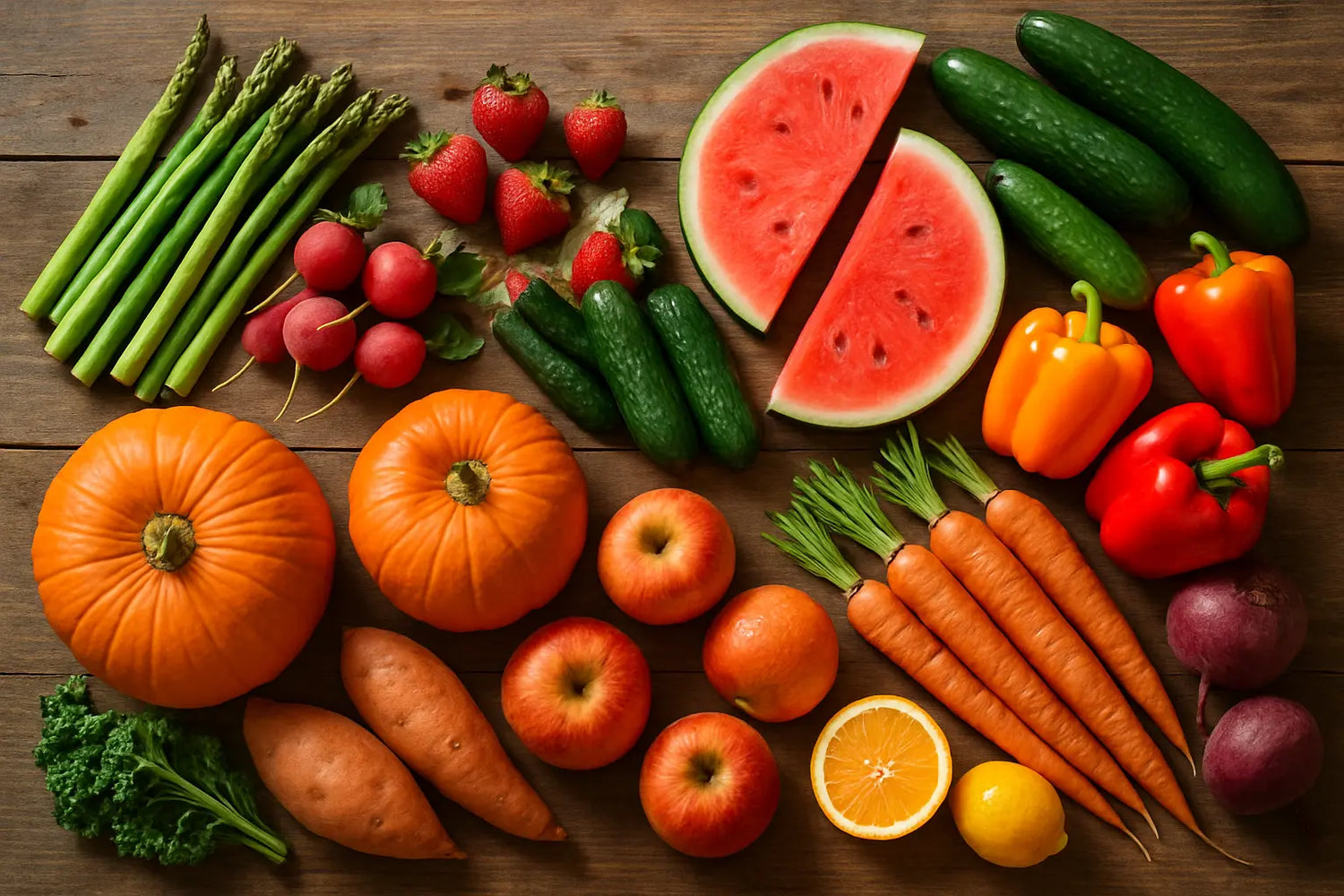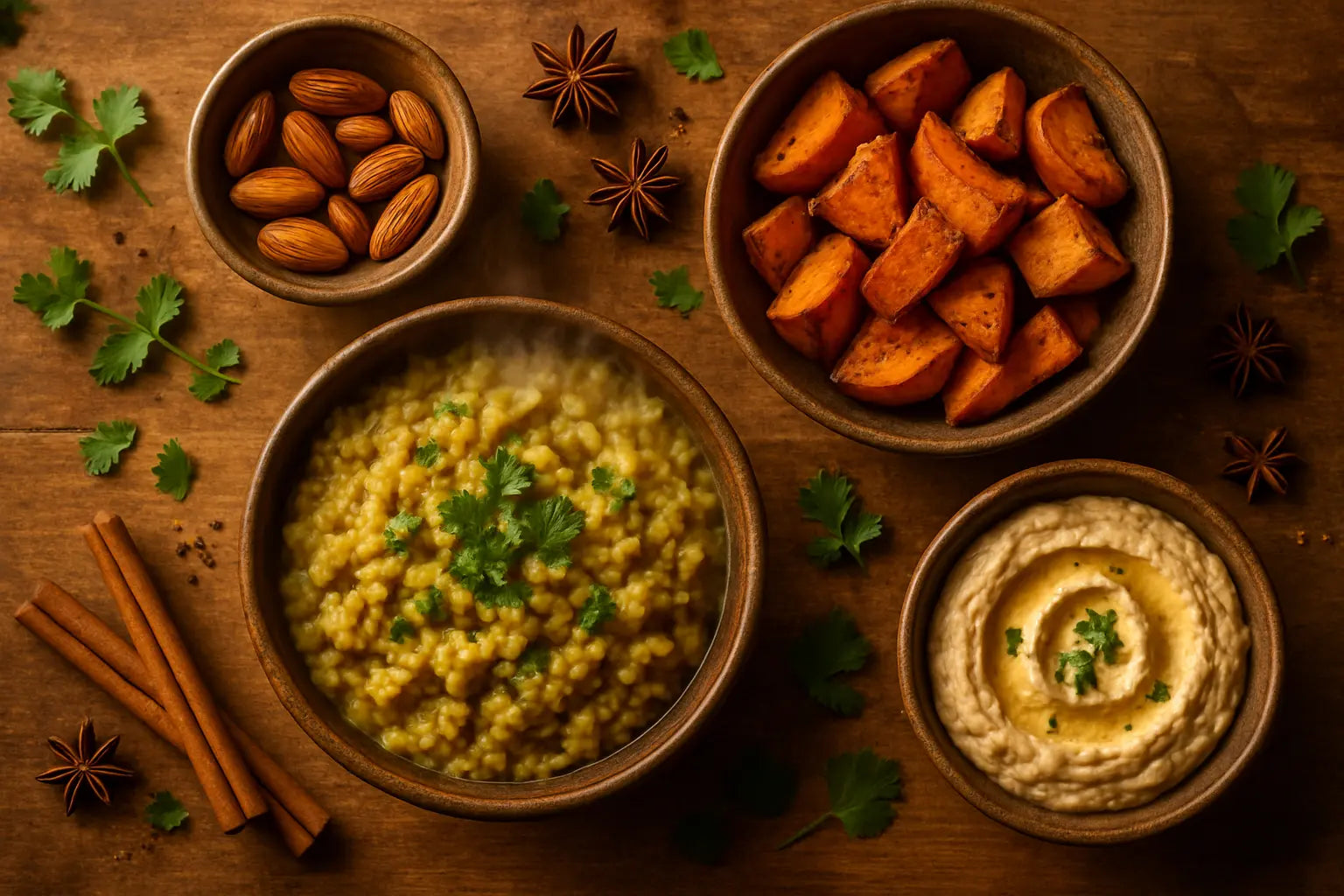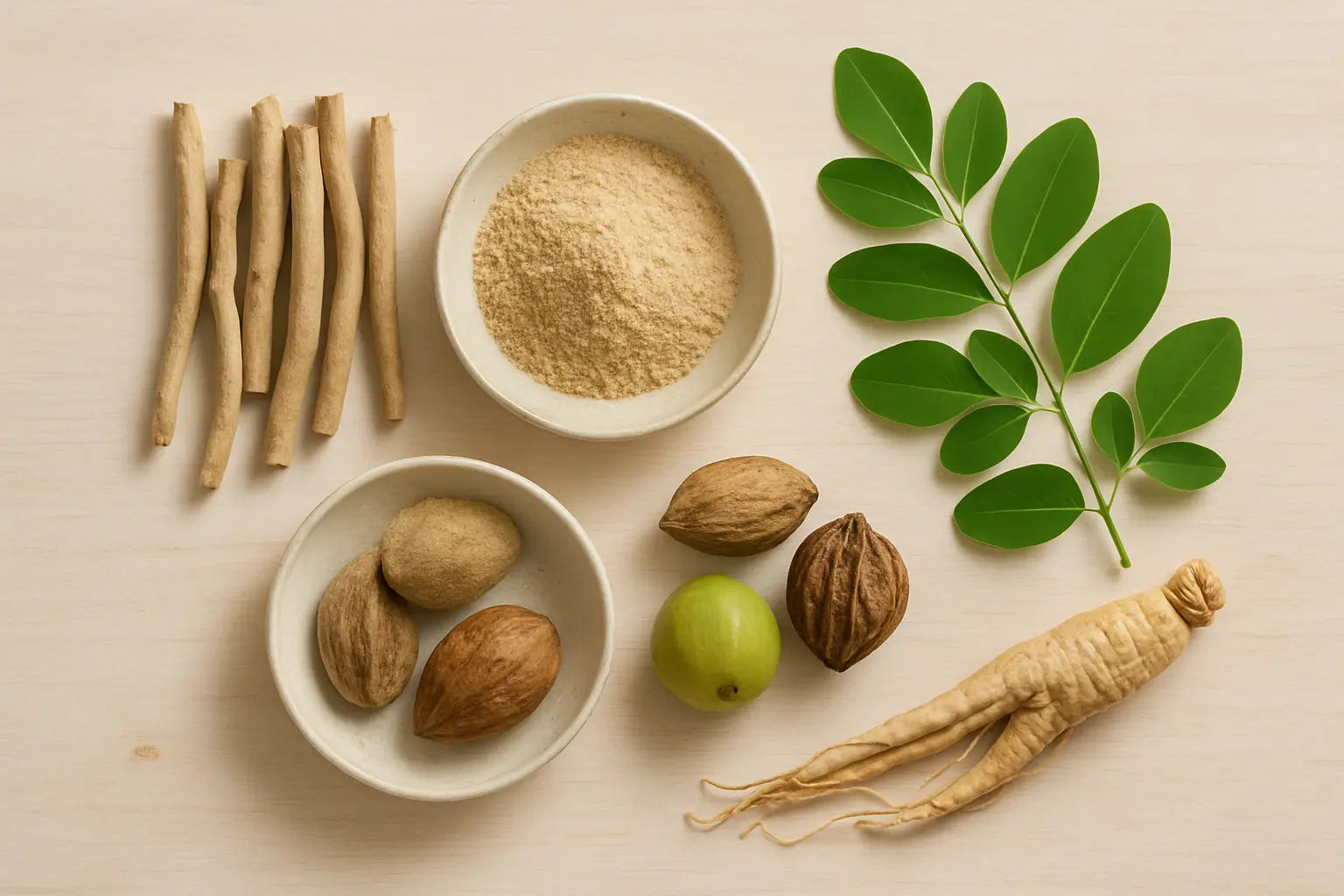Table of Contents
- The Secret Rhythm of Your Plate
- The Dance of the Seasons: Nature's Perfect Plan
- Why Should You Eat Seasonally? The Amazing Benefits
- Balancing Your Doshas with Seasonal Foods
- Answers from the Experts: Ayurveda Q&A
- Supercharge Your Seasonal Diet
- Ingredients Deep Dive: The Power Within
- Frequently Asked Questions
The Secret Rhythm of Your Plate
Have you ever noticed how a juicy watermelon tastes so much better in the summer, or how a warm bowl of pumpkin soup feels just right on a chilly autumn evening? It’s not just your imagination. There's an ancient wisdom our bodies instinctively understand, a rhythm that connects us to the world around us. In our modern lives, with supermarkets offering strawberries in December and asparagus in October, it’s easy to forget this connection. We've become disconnected from the very source of our nourishment. But what if I told you that syncing your diet with the seasons could unlock a new level of health and vitality? This is the core principle of seasonal eating in Ayurveda, the ancient Indian science of life. It’s a simple yet profound way to harmonize your body with nature’s cycles for optimal well-being.
The Dance of the Seasons: Nature's Perfect Plan
Imagine Mother Nature as a brilliant chef, creating a unique menu for each season. Ayurveda teaches us that the world operates in cycles, and our bodies are a part of that grand design. Each season brings a unique harvest of fruits, vegetables, and grains that contain the exact properties our bodies need to thrive during that specific time of year.
- Spring is a time of renewal and cleansing after a heavy winter. Nature provides light, bitter, and astringent foods like leafy greens, sprouts, and berries to help detoxify the body and shed winter weight.
- Summer brings the heat, and our bodies crave cooling, hydrating foods. Nature offers sweet, juicy fruits like melons, cucumbers, and mangoes to keep us cool and prevent overheating.
- Autumn is a transitional season, often windy and dry. To combat this, nature gives us grounding, nourishing foods like root vegetables (sweet potatoes, carrots), pumpkins, nuts, and seeds.
- Winter is cold and demands warmth and energy. Nature provides hearty, oily, and warm foods like root vegetables, whole grains, and warming spices such as cinnamon and ginger to insulate our bodies and keep our digestive fire strong.
Why Should You Eat Seasonally? The Amazing Benefits
Aligning your diet with the seasons isn't just a poetic idea; it comes with real, tangible benefits for your health.

- Boosts Digestion: Seasonal foods are what your body is naturally prepared to digest at that time of year. This alignment makes digestion smoother and more efficient, reducing issues like bloating and indigestion.
- Higher Nutritional Value: Studies show that fruits and vegetables harvested in their natural season are packed with more vitamins, minerals, and antioxidants. When produce is picked at its peak, it’s at its most nutritious.
- Promotes Mental Balance: Living in harmony with nature’s cycles has a calming effect on the mind. Seasonal eating helps reduce stress and promotes a sense of grounding and well-being.
- Better Taste: Let's be honest, a sun-ripened summer tomato tastes infinitely better than a pale, hard one from the middle of winter. Seasonal food is fresher, tastier, and more vibrant.
- Supports Local Economy & Environment: Eating seasonally often means eating locally. This supports local farmers and reduces the carbon footprint associated with shipping food across long distances.
Balancing Your Doshas with Seasonal Foods
In Ayurveda, everyone has a unique constitution made of three fundamental energies or doshas: Vata (air and space), Pitta (fire and water), and Kapha (earth and water). The seasons also have dominant doshic qualities, and eating accordingly helps keep your personal doshas in balance.
-
Vata Season (Late Autumn & Winter): The cold, dry, and windy qualities of this season can increase Vata dosha, leading to anxiety, dry skin, and constipation.
What to eat: Focus on warm, cooked, and nourishing foods. Think sweet potatoes, beets, carrots, oats, rice, and healthy fats like ghee and sesame oil. Use warming spices like ginger, cinnamon, and cardamom. -
Pitta Season (Summer): The hot, intense nature of summer can aggravate the fiery Pitta dosha, causing issues like skin rashes, heartburn, and irritability.
What to eat: Choose cooling, sweet, and hydrating foods. Load up on cucumbers, melons, leafy greens (like kale and chard), coconut, and mint. Avoid overly spicy and oily foods. -
Kapha Season (Spring): The cool, damp, and heavy qualities of spring can increase Kapha dosha, leading to sluggishness, allergies, and weight gain.
What to eat: Opt for light, dry, and pungent foods. Berries, radishes, sprouts, beans, and spices like black pepper, turmeric, and ginger will help invigorate your system and promote detoxification.
Answers from the Experts: Ayurveda Q&A
Many people are curious about how to apply Ayurvedic principles to their daily lives. Here are some common questions and answers to guide you:
-
What is the perfect diet sequence according to Ayurveda?
Ayurveda suggests starting your day with warm water. By mid-morning, you can have fresh seasonal fruits. Your main meal, lunch, should be the largest, consumed when your digestive fire is strongest. Dinner should be lighter and eaten earlier in the evening. -
What should you eat every day as per Ayurveda?
Ideally, you should eat local, seasonal food made from scratch. A balanced meal includes all six tastes (sweet, sour, salty, pungent, bitter, astringent) to ensure satisfaction and proper nutrition. -
I'm interested in eating according to the Ayurvedic system. Where do I start?
A great starting point is to focus on whole foods. Broadly, an Ayurvedic lifestyle advises eating grains, vegetables, fruits, sprouts, and herbs (spices). Start by simply incorporating more fresh, seasonal produce into your meals. -
What is the best time to eat food according to Ayurveda?
The best time for lunch is between 10 AM and 2 PM, when your digestive fire (Agni) is at its peak. Dinner should be eaten between 6 PM and 7:30 PM, allowing your body ample time to digest before sleep.
Supercharge Your Seasonal Diet
Eating with the seasons is a powerful foundation for health. However, in our demanding world, it can be challenging to get every single nutrient your body needs. This is where high-quality supplements can act as your health insurance, filling in the gaps and giving your body extra support.
For Overall Vitality: Daily All Day Vita Blend
To ensure you’re firing on all cylinders, our Daily All Day Vita Blend is your perfect partner. This holistic formula combines 23 essential vitamins and minerals with 23 powerful Ayurvedic herbs like Ashwagandha, Moringa, and Panax Ginseng. It’s designed to boost immunity, increase energy levels, enhance strength, and support great gut health. It’s a simple way to nourish your body from the inside out and complement your healthy, seasonal diet.
For Digestive Harmony: Daily All Day Triphala 1:2:3
A cornerstone of Ayurvedic health is a happy digestive system. Triphala is a legendary herbal remedy known for its gentle cleansing and detoxifying properties. Our Daily All Day Triphala 1:2:3 uses a traditional formula to cleanse the colon, relieve constipation, reduce bloating, and improve overall bowel health. It's a fantastic way to support the natural detoxification processes encouraged by seasonal eating.
Ingredients Deep Dive: The Power Within
Let's take a closer look at some of the star ingredients in our supportive formulas:

- Ashwagandha (in Vita Blend): Often called the “king of Ayurvedic herbs,” Ashwagandha is a powerful adaptogen. This means it helps your body manage stress, boosts brain function, and increases energy and strength.
- Panax Ginseng (in Vita Blend): This rare and potent herb is celebrated for its ability to fight fatigue and enhance physical performance. It’s a natural energy booster that supports vitality throughout the day.
-
Triphala (Amla, Baheda, Harad): This classic trio is the foundation of our Triphala formula.
- Amla (Indian Gooseberry): Extremely rich in Vitamin C, it boosts immunity and is excellent for skin and hair health.
- Baheda (Bibhitaki): Known for its detoxifying properties, it supports respiratory health and helps clear congestion.
- Harad (Haritaki): Often called the “king of medicines,” it is famous for improving digestion and relieving constipation.
Frequently Asked Questions
- 1. What exactly is seasonal eating in Ayurveda?
- - Seasonal eating in Ayurveda is the practice of consuming foods that are naturally harvested during a specific season. The idea is that nature provides the ideal foods with the right nutrients and energies (hot, cold, dry, moist) to help our bodies adapt to the environmental conditions of that season, keeping our doshas in balance.
- 2. How does seasonal eating help balance my doshas (Vata, Pitta, Kapha)?
- - Each season has qualities that can increase a particular dosha. For example, hot summer increases fiery Pitta. Eating cooling foods like cucumber and melon, which are summer-seasonal, helps to pacify or balance that excess Pitta. Similarly, eating warm, grounding root vegetables in the cold Vata season helps counteract the cold and dry qualities.
- 3. Is it okay to eat non-seasonal foods sometimes?
- - While the ideal is to eat seasonally, modern life requires flexibility. The goal is not perfection but balance. Aim to have the majority of your diet (around 80%) consist of seasonal foods. Having an out-of-season fruit occasionally is perfectly fine and won't derail your health journey. Listen to your body and do what feels best.
- 4. Can supplements like multivitamins support a seasonal diet?
- - Absolutely! Supplements can be a great way to support a healthy diet. Even with the best seasonal eating plan, soil depletion and modern lifestyles can lead to nutritional gaps. A high-quality multivitamin, like the Daily All Day Vita Blend, can provide a safety net, ensuring your body gets a consistent supply of essential vitamins, minerals, and supportive herbs for overall wellness.
- 5. What's the easiest way to start eating seasonally?
- - The simplest way to start is by visiting a local farmers' market. See what's abundant and fresh—that's what's in season! You can also look up a seasonal produce guide for your specific region online. Begin by swapping one or two items in your grocery cart for their seasonal alternatives. For example, choose berries in the spring instead of citrus, or opt for squash in the fall instead of zucchini.

In a world that often rushes past nature's quiet wisdom, Ayurveda invites us back to a simpler, more powerful way of living. Embracing seasonal eating is not just a diet change; it’s a lifestyle transformation that aligns your body with the earth's natural rhythms. By choosing foods that are fresh, local, and in season, you tap into a source of nourishment that is more potent, easier to digest, and perfectly suited to your body's needs. This practice helps balance your doshas—Vata, Pitta, and Kapha—leading to better digestion, stronger immunity, and enhanced mental clarity. To further support your journey, products like our Daily All Day Triphala 1:2:3 can enhance your digestive health and detoxification, while the Daily All Day Vita Blend ensures you fill any nutritional gaps, keeping your energy and vitality high. Let this be your invitation to embrace the symphony of the seasons. Start small, visit a local market, and let nature’s bounty guide you to a healthier, more harmonious life.





















